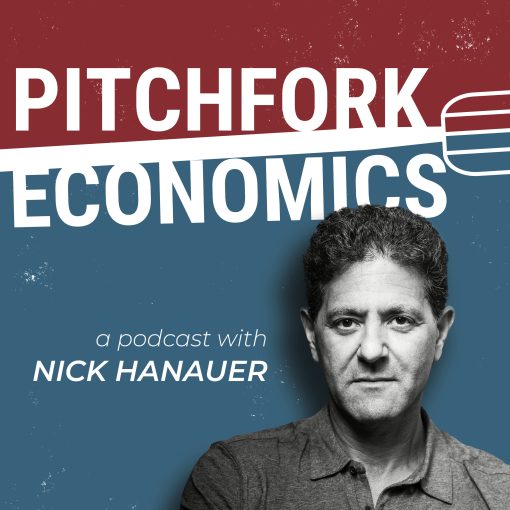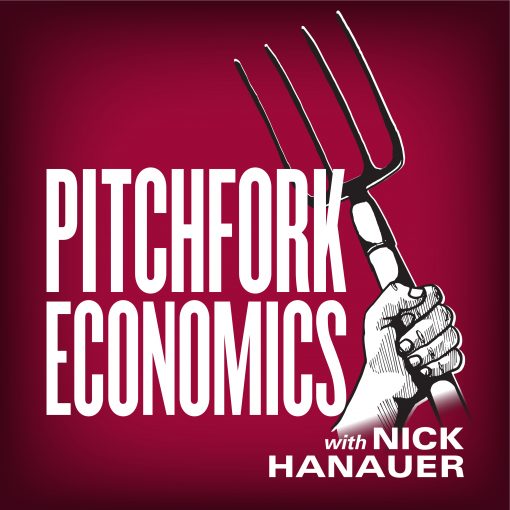Eleven years ago, Democracy Journal released a special issue on “The Middle Out Moment” that explored the implications of what was then the brand-new theory of middle-out economics. The moment may not have fully arrived back in 2013, but no doubt it’s here now. So this week, Democracy Journal is publishing a follow-up edition called “The Middle Out Moment Part Two,” marking the fact that what was once a new idea has now gone mainstream. In this episode, we’ll hear from several of the economists, researchers, and former administration officials who contributed to the special issue as they explore how middle-out economics has been put into practice — and discuss the work that lies ahead as middle-out economics becomes the new mainstream.
What labor shortage? (with Heidi Shierholz)
When employers say they can’t find workers, what they really mean is that they can’t find enough people willing to work for what they want to offer. The so-called “labor shortage” we’ve heard so much about these last few years is actually just a wage shortage. And the solution is simple: pay people more. Labor Day weekend felt like a good time to revisit this subject with EPI President, Heidi Shierholz.
The high price of misclassification (with Heidi Shierholz)
A new report from the Economic Policy Institute found that anywhere from 10 to 30 percent of employers are essentially stealing thousands of dollars from their workers every year by misclassifying them as independent contractors. In addition to lower pay, those misclassified workers are also deprived of employer-provided benefits like health care and labor rights like basic safety regulations. Returning guest Heidi Shierholz walks us through the report and explains how to figure out if your employer is stealing from you by classifying you as an independent contractor.
It’s not a labor shortage, it’s a wage shortage (with Heidi Shierholz)
You have no doubt seen the scary headlines warning of a “labor shortage” caused by the additional pandemic unemployment insurance payments. The coverage of this story is widespread, even though most economics reporters can find no credible evidence linking unemployment checks to a labor shortage. EPI economist Heidi Shierholz joins us to explain why UI and stimulus payments aren’t causing a “labor shortage”, and why the answer to this made-up problem is so clear: it’s the low wages, stupid.
Heidi Shierholz is the Senior Economist and Director of Policy at the Economic Policy Institute.
Understanding the CARES Act (with Heidi Shierholz)
The Coronavirus Aid, Relief, and Economic Security Act (CARES) is big—but not big enough to protect working people. Economist Heidi Shierholz joins the show to explain where CARES falls short, and to recommend the safeguards we need to include in future bailout packages.nHeidi Shierholz is a Senior Economist and Director of Policy at the Economic Policy Institute. Her team monitors wage and employment policies coming out of Congress and the administration, and advances a worker-first policy agenda. nTwitter: @hshierholzn@EconomicPolicyn(News clip from FOX 17 VXMI)nnFurther reading: nDespite some good provisions, the CARES Act has glaring flaws and falls short of fully protecting workers during the coronavirus crisis: https://www.epi.org/blog/despite-some-good-provisions-the-cares-act-has-glaring-flaws-and-falls-short-of-fully-protecting-workers-during-the-coronavirus-crisis/nnA widening toll on jobs: ‘This thing is going to come for us all’: https://www.nytimes.com/2020/04/02/business/economy/coronavirus-unemployment-claims.htmlnnDoes the stimulus package pass the test? https://civicskunk.works/does-the-stimulus-package-pass-the-test-a070bf4922dcnn3.5 million workers likely lost their employer-provided health insurance in the past two weeks: https://www.epi.org/blog/3-5-million-workers-likely-lost-their-employer-provided-health-insurance-in-the-past-two-weeks/nnNearly 20 million workers will likely be laid off or furloughed by July: https://www.epi.org/blog/nearly-20-million-jobs-lost-by-july-due-to-the-coronavirus/nnThe CARES Act’s aid to state and local governments isn’t enough to shield vital public services from the coronavirus shock: https://www.epi.org/blog/the-cares-acts-aid-to-state-and-local-governments-isnt-enough-to-shield-vital-public-services-from-the-coronavirus-shock-lessons-from-the-great-recession-tell-us-why/nnStates get billions in record stimulus – but say it’s not enough: https://www.politico.com/states/new-york/albany/story/2020/03/26/states-get-billions-in-record-stimulus-but-say-its-not-enough-1269230nnHere are safeguards needed in bailout packages to protect working people and fight corporate greed: https://www.epi.org/blog/any-industry-bailout-package-must-include-meaningful-protections-for-working-people-and-guardrails-against-corporate-greed/nnA portrait of disaster: https://www.epi.org/press/a-portrait-of-disaster-initial-ui-claims-jump-from-211000-to-6-6-million-in-three-weeks/nnPolicymakers twice missed the chance to avert widespread job loss, now they should act to avoid more layoffs: https://www.epi.org/blog/policymakers-twice-missed-the-chance-to-avert-widespread-job-loss-now-they-should-act-to-avoid-more-layoffs/nnCongress “CARES” for wealthy with COVID-19 tax policy provisions: https://itep.org/congress-cares-for-wealthy-with-covid-19-tax-policy-provisions/nnWebsite: https://pitchforkeconomics.com/nTwitter: @PitchforkEconnInstagram: @pitchforkeconomicsnNick’s twitter: @NickHanauernLearn more about your ad choices. Visit megaphone.fm/adchoices
The robots are coming… what now? (with Heidi Shierholz and Daron Acemoglu)
With every technological advancement since the dawn of time, conventional wisdom has warned that technology and automation kills jobs. But robots aren’t the root cause of our problems. Although technology has always changed the nature of work, this week’s guests Heidi Shierholz and Daron Acemoglu argue that there is no evidence that it has led or will lead to overall increased joblessness, unemployment, or wage stagnation.nHeidi Shierholz is a Senior Economist and the Director of Policy at the Economic Policy Institute. She was a Chief Economist at the U.S. Department of Labor under President Obama from 2014 to 2017. Her research and insights on labor and employment policy, the effects of automation on the labor market, wage stagnation, inequality, and many other topics routinely shape policy proposals and inform economic news coverage. nTwitter: @hshierholznDaron Acemoglu is a Professor of Economics at the Massachusetts Institute of Technology. He is the co-author of the New York Times and Wall Street Journal bestselling book ‘Why Nations Fail’, with James A. Robinson. In 2005, he received the John Bates Clark Medal, awarded to economists under forty judged to have made the most significant contribution to economic thought and knowledge. nTwitter: @DrDaronAcemoglunFurther reading: nThe zombie robot argument lurches on (EPI): https://www.epi.org/publication/the-zombie-robot-argument-lurches-on-there-is-no-evidence-that-automation-leads-to-joblessness-or-inequality/nHow robots became a scapegoat for the destruction of the working class (The Week): https://theweek.com/articles/837759/how-robots-became-scapegoat-destruction-working-classnAutomation, Job Loss, and the Welfare State (Council on Foreign Relations): https://www.cfr.org/event/automation-job-loss-and-welfare-statenRobots, or automation, are not the problem (EPI): https://www.epi.org/publication/robots-or-automation-are-not-the-problem-too-little-worker-power-is/nRobots kill jobs. But they create jobs, too. (Brookings): https://www.brookings.edu/blog/up-front/2019/03/18/robots-kill-jobs-but-they-create-jobs-too/nWhere Do Good Jobs Come From? (Project Syndicate): https://www.project-syndicate.org/commentary/automation-vs-job-creation-by-daron-acemoglu-2019-04?barrier=accesspaylognThe Revolution Need Not Be Automated (Project Syndicate): https://www.project-syndicate.org/commentary/ai-automation-labor-productivity-by-daron-acemoglu-and-pascual-restrepo-2019-03?barrier=accesspaylog





